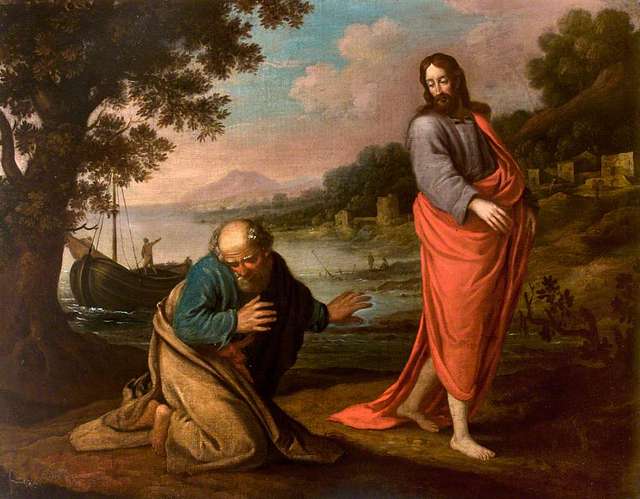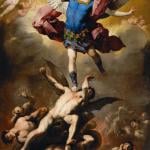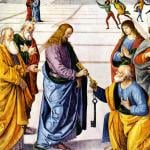
This is a collection of commentary that I have made about this passage in various articles through the years.
*****
Luke 22:31-32 (RSV) “Simon, Simon, behold, Satan demanded to have you, that he might sift you like wheat, [32] but I have prayed for you that your faith may not fail; and when you have turned again, strengthen your brethren.”
Are we to believe that no other disciples would have instances of failed faith? Only one of them, after all, was present at His crucifixion (St. John). Did none of them experience a lack of faith during that terrible time of His Passion? Of course they did! “Doubting Thomas” is an obvious example. So the relevant question is: why is it that Jesus is praying only for Peter’s faith? And why is Satan after him: so much so, that Jesus mentions it as something to pray for?
In trying to search for it, I can’t find any other passage where Jesus is described as “I have prayed for you” or “I will pray for you” in reference to a single person. Peter’s the only one I can find (if someone knows of another, please let me know). I’m not claiming that Jesus didn’t pray for people. What I’m saying is: the fact that Holy Scripture seems to highlight only Peter as one whom Jesus specifically prayed for, must be significant. Then Jesus adds: “when you have turned again, strengthen your brethren” (Lk 22:32). He is to do that precisely because he is the leader, whose job it is (among many other thing) to edify and strengthen other believers.
***
He encouraged him to be a pastor of what is arguably the entire Church . . . [in] Luke 22:32 and Matthew 16:18-19. . . .
When Jesus says, “I have prayed for you that your faith may not fail; and when you have turned again, strengthen your brethren” (Lk 22:32), this was at the Last Supper, with all the disciples present. Why does Jesus say this only to Peter, then? That’s the significance. If Peter wasn’t special and the leader, it seems to me that He would have said it to all of them. After all, most of His words at the Last Supper were directed to all of His disciples. Peter’s faith, as I have noted several times in my writings, failed for maybe 10-15 minutes, when he made his denials: in the face of possible imprisonment and/or death (i.e., strong coercion or danger). He lost his nerve. Then he heard the cock crow and immediately repented. Contrast that with Paul, who was persecuting and killing Christians for an extended period of time, and had to be more or less forced by God to repent.
Peter wasn’t constantly wavering in his faith. He wasn’t doubting Thomas. He wasn’t any worse than the other disciples (only one — John — was with Jesus at the crucifixion). He seemed to have the most understanding and zeal among the disciples before Pentecost. Peter was the one (not the others) who jumped into the stormy sea with Jesus, to walk on the water, etc. Sure, he sunk soon after, but at least he jumped in in the first place. Jesus said this and prayed for Peter precisely because he was the leader, which was also indicated by the verse preceding: “Satan demanded to have you, that he might sift you like wheat” (22:31). Why Peter? Why not all of the disciples? It’s because — as always! — Peter was the leader. That’s why Satan was after him: so much so that Luke made it a note to record that Jesus pray specifically for him. Satan thought he had defeated Jesus, so Peter was the next target, because a movement is rooted out by killing its leaders. . . .
Protestants generally want to highlight the one thing and ignore other equally — or even more — obvious elements. The “restoration / undoing of the denials” theme is a reasonable, plausible take, and I myself agree that it’s present in both passages. But asking Peter to feed His sheep and praying that his faith wouldn’t fail are two things that fit right in with a belief (grounded in many passages and indications) that he was the leader of the Church, and that this was also a reason why Jesus said those specific things. It was a double application. In other words, I submit that the “papal” aspects are as clear and evident as the “restoration” aspects in both passages. But we need not choose between them in the first place.
***
[Vatican I] does not assert that the entire teaching [of the papacy] is based on Luke 22:32. It merely gives that passage as a proof text, not for papal infallibility per se, but rather, for the indefectibility of the Church, as centered and grounded in the orthodoxy of the popes. Again, this does not mean that absolutely every Father took this interpretation of Luke 22:32, if that is what is being implied. What was received from the beginning was papal primacy and universal jurisdiction, which is the essence and “seed” of papal infallibility, just as the biblical statement “Jesus is Lord” is the “seed” of the exceedingly complex and highly philosophical Chalcedonian Christology of 451 A.D.
***
Why is Jesus praying for something that can’t possibly happen, anyway? Calvinism says that Peter’s faith cannot ultimately fail; that he can’t possibly fall away. Jesus wouldn’t, for example, pray that Peter would spend eternity in both heaven and hell, because that is impossible by the laws of logic and according to the revelation of theology. Therefore, this verse and saying of Jesus shouldn’t exist and shouldn’t be enshrined in the inspired Bible, according to the logic of Calvinism. Nor does it follow that no one’s faith can ever fail, because the faith of Peter: chosen by Jesus to lead His disciples and His new Church, did not fail to the extent of losing his salvation.
***
From this we learn two important things: 1) Peter had faith, and 2) it could possibly fail. If it couldn’t possibly fail, then Jesus’ prayer makes no sense. Neither Jesus nor anyone else prays for things not to happen that can’t ever possibly happen anyway. We don’t pray that basic mathematics not fail, so that, tomorrow, 2+2 won’t = 5. It can’t change, and so there is no need to pray that it won’t change. No one could pray that God would cease being eternal, or that Jesus wouldn’t return in the Second Coming, because those things are impossible and can never happen.
Therefore, Peter’s faith could have possibly failed, which means (by straightforward logical extension) that anyone’s faith could do so.
***
Peter falters and denies Christ three times, but after he is filled with the Holy Spirit it is a different story. Jesus prays for him in a special way because he is the leader of the Church: “I have prayed for you that your faith may not fail” (Lk 22:32); and indeed it doesn’t, after Pentecost. This is a type and shadow of papal infallibility, as is being given the keys of the kingdom (Matt 16:19): only given to Peter; and all the implications of that (rightly understood, in light of its OT precursors).
***
According to [Steve] Hays’ reasoning, Jesus would have had to pray for all the disciples (save John), who would “fall away” and be “scattered” and “leave” Him “alone” when He was led away to His trial and passion and crucifixion. But He only prays for Peter (and I believe this is the only time the NT shows Him praying individually for a disciple, by name). We believe He did because Peter was the Rock, and he had to repent in order to fulfill his duties as the first leader and pope of the new Christian Church that Jesus built upon him. The “strengthen your brethren” implies (or is at the very least consistent with) this leadership. In other words, Peter was so important that the NT made it a point to show how Jesus prayed for him to have the strength to perform his ministry.
***
He prays for Peter’s faith (knowing the brutal personal aftermath he would go through after denying the Lord three times). But He also prays for his function of strengthening the brethren, which is what leaders of apostles and popes (following them) habitually and characteristically do.
Of course all the apostles “strengthen”, as well as non-apostle Christian believers. But what’s missed here and with regard to other Petrine / papal passages is the sense of St. Peter as preeminent. The apostles do certain things; Peter is their leader. Likewise, by analogy, the pope is the leader of the Christian Church, even though bishops do many things the pope does, on a lesser scale and with less than universal jurisdiction.
One can cite the example of St. Paul “strengthening all the disciples” (Acts 18:23; cf. 14:22; 15:41; 16:5; Rom 1:11) and the “prophets” Judas and Silas exhorting and strengthening the “brethren” (Acts 15:32). Of course they do. But it’s no proof that Peter does not do so in a universal sense; over against their local exercise of the spiritual gift of strengthening others. St. Paul also refers to God strengthening Christians (Rom 16:25; Eph 3:16; Phil 4:13; Col 1:11; 2 Thess 3:3), as does St. Peter (1 Pet 5:10).
The difference is that Jesus specifically commissions Peter (just as in the Matthew 16 passages) to play this role among believers in the new Church. So Protestants want to play this down as of no particular Petrine significance? I don’t think it’s easy to do, if they are trying to faithfully abide by what Scripture teaches.
We can examine, for example, how very few times Jesus prayed for others by name in Holy Scripture. The phrase of Jesus, “I have prayed for you” occurs only here in the New Testament (in RSV). In fact “prayed for” applied to Jesus, meaning intercession for a human being, only appears here also. The word “prayed” referring to Jesus appears nine times in the New Testament. The passage above is one of them. Six other times it refers to Jesus praying in the Garden of Gethsemane about His Passion. The remaining two (Mk 1:35; Lk 5:16) refer to Jesus withdrawing alone and praying (no specific subject or object of prayer stated).
We can search “pray” in reference to Jesus and we find the same general thing: He is praying by Himself for we know not what (Mt 14:23; Mk 6:46; Lk 6:12; 9:18; 11:1), praying at His baptism (Lk 3:21), praying for many children (Mt 19:13), praying in Gethsemane (Mt 26:26; Mk 14:32; Lk 22:45), praying with (not for) Peter, John, and James right before the transfiguration (Lk 9:28-29), praying for the Holy Spirit to be given to believers (Jn 14:16), praying for the disciples as a group (Jn 17:9, 15), and for all Christians to come (Jn 17:20).
That’s the complete record, in terms of searching “pray” /”prayed” / “prayer” in the New Testament (in the RSV). I think it’s also clear that Jesus prayed for Lazarus (John 11:41: “”Father, I thank thee that thou hast heard me.”) before He raised him (which is, of course, prayer for the dead: something Protestants tell us is heresy and unacceptable practice).
Thus, the only other single person that Scripture records Jesus interceding for is Lazarus. The instance with Peter above is the only time we see Him praying for one of His disciples about what he will be tasked to do: to strengthen his brethren. Surely, this is highly significant, and it has to do with a central task of what popes do: they guide, exhort, and strengthen Christian believers.
***
The Jesuit apologist Nicholas Russo and St. Francis de Sales explain how this charge to St. Peter suggests the need for an ongoing, infallible papacy:
In this passage there is question of infallibility. For infallibility is nothing else but a supernatural gift by which the recipient is shielded from all error against faith. But – a) this is clearly expressed in the words, that thy faith fail not; b) it is implied in the command to confirm his brethren; c) it is supposed in the very failure of Satan’s attempts to destroy the Church, which is personified in the Apostles, and which depends essentially upon faith . . .
The temptation is common, but the prayer was offered for Peter alone; not because Our Lord was less solicitous for the rest of the Apostles, says Bossuet, but because by strengthening the head He wished to prevent the rest from staggering. Now this duty of confirming his brethren was to last as long as the Church; and Peter, accordingly, abides always in his successors . . . Strange, indeed, would it be to suppose that the doctrinal infallibility of the Head of the Church should cease just when the need becomes greater and more urgent. Christ would in this supposition have rendered His first vicar infallible . . . and denied this divine assistance to all the rest of His vicars on earth, when in their times the dangers were to be greater . . . If this consequence be absurd, our position is unassailable. [Nicholas Russo, The True Religion, New York: P.J. Kenedy & Sons, 1886, pp. 124-126]
He prays for St. Peter as for the confirmer and support of the others; and what is this but to declare him head of the others? Truly one could not give St. Peter the command to confirm the Apostles without charging him to have care of them . . . Is this not to again call him foundation of the Church? If he supports, secures, strengthens the very foundation-stones, how shall he not confirm all the rest? If he has the charge of supporting the columns of the Church, how shall he not support all the rest of the building? If he has the charge of feeding the pastors, must he not be sovereign pastor himself? . . . Our Lord . . ., having planted this holy assembly of the disciples, prayed for the head and the root, in order that the water of faith might not fail to him who was therewith to supply all the rest, and in order that through the head the faith might always be preserved in the Church. [St. Francis de Sales, The Catholic Controversy, translated by Henry B. Mackey, Rockford, Illinois: TAN Books, 1989 (originally 1596), pp. 306-307]
***
It is the adversary who began the aggression, with Satan wanting to disperse the little company of Jesus’ followers. But instead of saying, `I pray for you all’ as might have been expected, Jesus speaks only of His prayer for Peter, the one, that his faith might not fail. For if this faith remains firm because of Jesus’ prayer, then the attack directed against all of them is repelled. They will all be steadfast in the faith, strengthened by the one. In Matthew 16:22-23, we see how very powerfully Satan tempts only this one apostle. Right after Simon had been chosen as `the rock’ he aspired to surpass even Jesus, suggesting that his own will prevail, but Jesus commanded the tempter to leave, and ordered His disciple to take his place behind Him and to follow Him until death. [Lutheran Richard Baumann, in Hans Asmussen, et al, The Unfinished Reformation, translated by Robert J. Olsen, Notre Dame, Indiana: Fides Publishers Assoc., 1961: 170-171]
*
***
*
Summary: Various commentaries of mine on “Petrine verse” Luke 22:32 (RSV): “I have prayed for you that your faith may not fail; and when you have turned again, strengthen your brethren.”

















